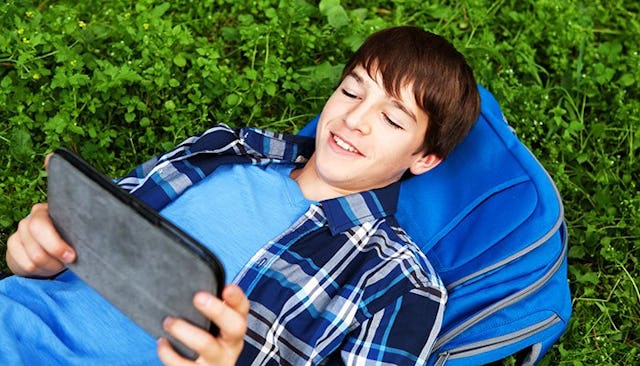What the Books Don't Tell You About Teenage Boys

There isn’t much cuter than a small boy with pudgy hands and wispy hair. One of motherhood’s greatest rewards is the love of a little boy.
And then they become teenagers.
Well, not even teenagers, actually. The fun begins around age 11. I know, if you have a toddler at home right now, that’s sooner than you had imagined. But trust me, from the moment they enter kindergarten, they are on a fast track to adolescence, and things start to go awry after the first decade.
Here’s what you should expect:
The Mess and Smell
Little boys, even when they have jelly stuck on their fingers and dried-up peanut butter on their cheeks, are endlessly snuggable. Their messy pants, as offensive as they might be, are even somehow sweet. At the very least, they aren’t repulsive. Cleaning little boys’ messes — runny noses or dirty feet — is like cleaning your own.
Then suddenly they become separate. Their dirt, smell and hygiene are all their own, and you might gag as you clean out their sports bag.
This is nature’s way of making you stop snuggling them. Because that would just be weird.
The Fighting
My two oldest sons used to be best friends. I prided myself on their closeness. Then they became teenagers, and their fights, metaphorically speaking, went something like this: one brother would aim for the most vulnerable place on the other — his grades, his cowlick, his size, his height — and go in for the knockout.
It is not at all uncommon these days to find them physically hurting one another on the kitchen floor. When I pull them apart, their hearts visibly beat in their necks.
This concerned me for a long time. I cried about it in my bathroom. And then one day my husband said, “Until the testosterone settles down, just know that we are basically living with two adolescent bucks ramming their horns.” He suggested I watch Animal Planet if I didn’t believe him.
The Aloofness
If toddlers had iPhones, the texts with their mothers would go something like this:
Kid: I love you more than chocolate cake.
Mom: I love you, too. Kid: I can’t wait to see you after school. Mom: Me, too. Let’s go to the park. Kid: Will you push me on the swings? I love it when you push me on the swings.
Texts with teenage sons go like this:
Mom: How was your day?
Teenager: Good. What’s for dinner?
I sometimes scan my boys’ phones because that’s the rule as long as they are younger than 18 and I’m paying for it. I am shocked when I see that my teenager, whose text vocabulary seems limited to “what’s for dinner,” actually has ongoing conversations — in full and multiple sentences — with his friends.
The Exaggerations
I have no scientific basis for this, but it’s been my experience that whatever your son is, he will become a bigger one as he moves through adolescence. If he’s argumentative by nature, prepare to feel like you’re living with a lawyer until the hormones settle down. If he was a naughty toddler (let’s face it, sometimes pretty cute), he will be an even naughtier teenager (definitely not cute). If he was always sort of lazy, dust will form on him on the couch.
The Negativity
It’s hard to believe this right now, but some days you will not enjoy your teenage boy. You always love him, yes, but that doesn’t mean you like being around him. It’s like the hormones and changes basically swallow up your sweet, sticky, loving toddler and turn him into something you thought only existed in after-school specials.
You once bathed this child. You wiped his nose. You rocked him to sleep. You kissed his sweet forehead.
Now you can’t wait for him to get out of your car.
But here’s the good news: Puberty eventually spits them back out, a little bit at a time. Occasionally you see glimmers of that sweet little boy buried beneath hairy arms and legs and, thank goodness, the smell of aftershave.
And then one day your teenager texts you and says, “Want to go get dinner together after baseball,” and you think you’ve won the lottery — or escaped what had seemed like a train wreck just months before.
The way I see it, the teenage years are a metamorphosis, and even the sweet, pudgy caterpillar’s cocoon is kind of hard to look at. But I am learning, as my oldest son seems to be emerging from the cave — I mean cocoon — that this thing with wings on the other side is really quite spectacular.
That’s when you realize, oh shoot, he can fly. He’s likable again. He’s interesting and fun to be around. He’s outside of his room more than he is in it.
Someday, he just might leave the nest.
And then, well, you feel sad.
Related post:
This article was originally published on